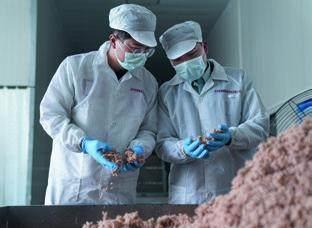Circle of Life
2022-04-13ByLiNan
By Li Nan
Du Haotian first visited Tsinghua University, a prestigious seat of learning in China, in the summer of 2013 to install air conditioners. At the time, he was a high school graduate with a part-time job in Beijing, awaiting his enrollment notification from Shenyang Agricultural University in northeast China.
Seven years later, Tsinghua invited Du, a 28-year-old entrepreneur who set up a food company in Shaanxi Province, to share his experiences in rural development at an upcoming webinar in 2022. “Tsinghua has witnessed my growth,” Du told Beijing Review.
Du was born into a farming family in Henan Province. His name, Haotian, which translates as“good at farming,” was given to him by his grandfather. But the young boy fumbled with the farm work.
“I’m clumsy. It would take me a long time to learn a new farming skill, whereas my brother would master it instantly after having seen and done it only once,” Du said. But Du proved resilient. Whatever he learns, he will put into practice to the best of his abilities until he has fully mastered the skill.
After entering university in 2013, Du continued to take on part-time gigs to support himself. “My mother always told me, ‘If you possess knowledge, use it to survive; if you don’t, you can survive on physical strength’.”
During his freshman year, he washed dishes, making 7 yuan ($1) an hour. Yet what was coming in couldn’t cover what was going out. After that, he switched to delivering food. In the beginning, he was shy. “My classmates nicknamed me ‘The Prince of Delivery’,” Du said. He soon got used to both the nickname and the job.
In his final year at school, Du received 5,000 yuan($782) from an anonymous Shanghai benefactor. Later, as his part-time jobs were paying off a little more, he wanted to return the sum. Nevertheless, he was told that as the donation had been made anonymously, he would not get access to the giver’s information. “I then realized love expects no rewards,” Du said.
In 2017, Du went on to become a postgraduate student at Northwest Agricultural and Forestry University (NAFU) in Shaanxi. “NAFU has a tradition of introducing scientific research achievements onto campus,” said Du. In the first two years, he, by outsourcing, turned some of NAFU’s produce into products, such as wheat flour and traditional ricedumplings. As he started selling them on campus, his knack for entrepreneurship became widely known throughout the school.
In 2018, Du was told that a farmer named He Yongzhi in Xinglong Town, Zhenba County, Hanzhong in Shaanxi, was having trouble finding a market for his colored potatoes. The seeds for these potatoes had come courtesy of NAFU.
“There was 1 hectare of colored potatoes growing in our village. They are prone to decay,” He told Beijing Review. He asked Sun Jinqiu, then deputy head of Xinglong who was in charge of science and technology, if there was any way to sell or preserve the vegetables.
Sun was a NAFU postgraduate and as 2020 was the year when China vowed to eliminate absolute poverty, NAFU teamed up with counties including Heyang and Zhenba to create local jobs. Since 2018, the university has dispatched several postgraduate student teams to help local farmers improve production by introducing new crops and technologies.
Sun soon realized that the cost of cold storage far surpassed the local farming budget. So he asked Du if he could find a way to process the colored potatoes into products. Du, not wasting any time, purchased a ton of said vegetables. First, he wanted to make chips, but the local factory told him they couldn’t produce these. Instead, they gave him the option of turning them into guoba, a crispy snack originally known as rice crust. In October 2018, the first batch of guoba rolled off the production line. “They tasted good; we sold over 10,000 yuan ($1,569) worth of guoba within the first hour at the north campus on October 20, 2018, exceeding our expectations,” Du said.
Du visited Xinglong two months later. The locals proudly introduced him to the guoba. Little did they know that the snack was in fact the brainchild of Du. “I felt proud at that moment,”Du recalled.
In the following two years, Du and He became business partners. He sold colored potatoes to Du, who turned them into guoba before selling them back to He. “It was like a circle of life,” He said.
In early 2020, He proposed to Du that they pair up to establish a guoba factory in the village. Du accepted He’s invitation. “I can make a living doing any job, but I want to do something meaningful,” Du said.
The 28-year-old wanted to help locals grow and process their potatoes right on site. “It not only creates jobs, but also ensures there won’t be an oversupply of potatoes,” Du explained. “Also, I want to repay the Shanghai donator in this way, and pass on the love.”
In May 2020, one month before graduation, Du postponed his academic attainment to serve for six months as deputy director of the Commercial, Economic and Technological Cooperation Bureau of Heyang County, a Shaanxi county 500 km away from Zhenba.
During his term in Heyang, Du not only helped the county launch a millet guoba production line, but also established Greedy Cat Food Technology Co. Ltd. together with He to produce colored potato guoba in Xinglong.
Setting up a factory in a remote town wasn’t all smooth sailing. They started from scratch. Du was too busy to eat properly and, as a result, he became so ill that his hands kept shaking even when he was only holding his phone. “I was too weak to speak, and thought I was going to die,” Du said.
While they struggled, the local government gave them a leg up: offering up free factory buildings and assigning a subsidy of 1 million yuan ($156,983). “No matter what troubles we faced, the government always helped us to solve them together,”Du added. “Since then, my focus has shifted from my individual development to collective benefits.”

When the first piece of guoba rolled out on the first day of 2021, the two young entrepreneurs had a taste and brimmed with pride. Confident about the future, they scaled up production capacity in relatively short time. However, they failed to diversify their sales channels, and goods became overstocked. “We had to keep pumping money into the company. That was a difficult period,” Du said.
In March 2021, Du continued his service to the local community, becoming deputy head of Xinglong. One month later, Du, with his guoba, took part in an online food competition organized by Taobao, China’s major online shopping platform. Participants and products hailed from 17 universities, but Du’s guoba stood out from the crowd. This, together with his story, placed Du in the spotlight and he became an online celebrity.
“The media exposure proved a major push,” He said. Orders came flooding in and all of their stock sold out. Daily sales volume amounted to some 500 boxes. “We were gradually expanding both offline and online sales,” Du elaborated.
Greedy Cat created 28 local jobs. “Being able to contribute to the cause of absolute poverty elimination was a privilege for me,” Du said.
Many people encouraged Du to use his influence to sell goods via live-streaming. But he refused.
“Some said I missed out on the chance to make a fortune or become famous. But I don’t think so,” Du said. “When such opportunities occur, I should keep a clear head and make the right decision.”
In June 2021, Du graduated following a one-year delay. One month later, he withdrew his investment and began working as a technical advisor to support the company.
In the future, he hopes to engage in rural development research. “I want to learn more about agriculture, rural areas and farmers, as well as rural vitalization,” Du concluded.
Knowledge is power. As his grandfather had once hoped, Du is now good at farming and can assist more farmers in paving their way to a better life, with the help of knowledge. BR
